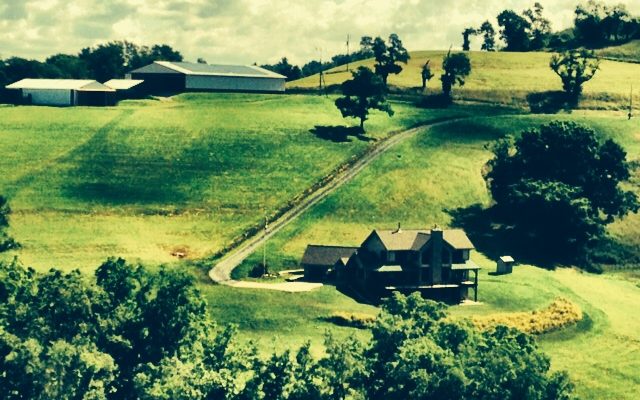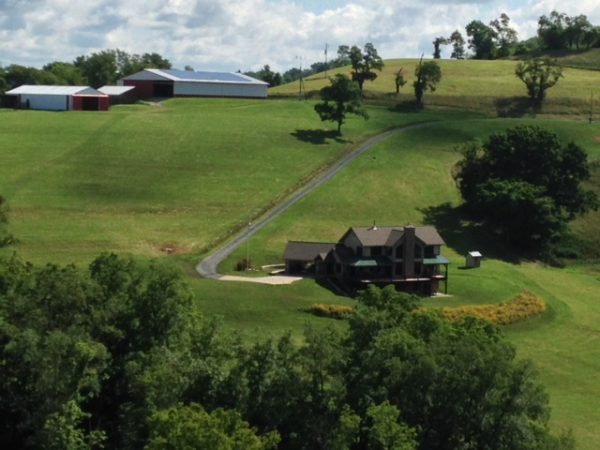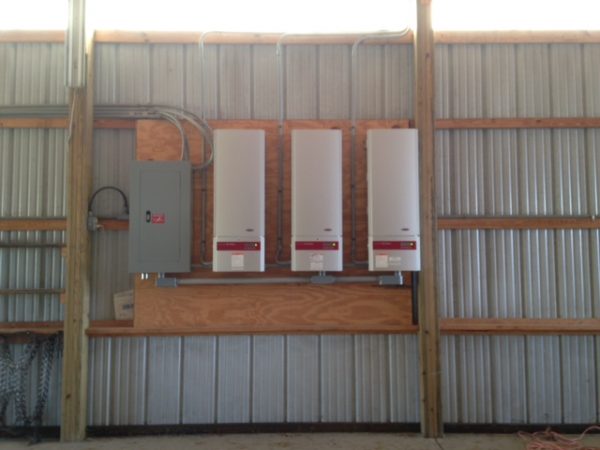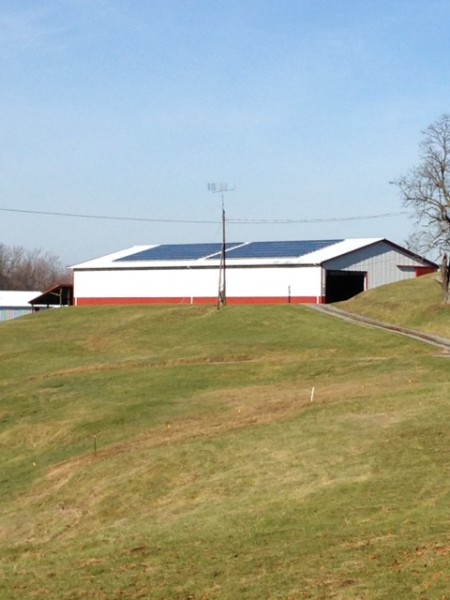I teach a special topics course titled “Introduction to Sustainability” at West Liberty University. Sustainability is defined as “the capacity of the earth’s natural systems and human cultural systems to survive, flourish, and adapt to changing environmental conditions into the very long-term future” (Miller and Spoolman, 2015, pp 4), and it is a trans-disciplinary field of learning. Through this course, we are engaging in the quest for a common future that is environmentally, economically, and socially balanced.
I read somewhere that we retain much more of what we experience than what we read, see or hear. Therefore, I am always eager to lead my students through experiences that will be remembered long after they have finished this course.
I met Mr. Richard Neihaus at a Wheeling Green Table meeting, when I found out that he owns a farm — not your typical farm but a solar farm. As an introduction to this unique man, he has stated that he lives according to this well-known Native American proverb: “We Do Not inherit the Earth from our Ancestors; rather we Borrow it from our Children.” I asked Mr. Neihaus if it would be possible to visit his farm, and he was very open to the idea. With the help of a West Liberty University van for transportation, we took a field trip to Big Cove Farm in Cameron, W.Va. We had a few guests, including a faculty member from the geography department and some other staff members. Our host was very hospitable and enthusiastic, and provided us with a wealth of information. Here, with permission, I would like to share some of my students’ reflections from the trip:
Student 1: “The trip to the solar farm in Cameron, W. Va., was overwhelmingly informative. To me solar panels were a mystery I remembered driving up to the barn and instantaneously thinking about how that simple panel could translate to working energy. I knew the sun had energy, but to me translating that into real life situations seemed like such a complex gap. In all reality the main thing I remember is grasping how energy is made: Two unstable, but attractive elements are placed on either side of the panel, and the natural energy from the sun is enough to excite the reaction between those two elements to continually react with each other. Although this is most likely very elementary, another discovery I made was about the limit of wattage that could be transmitted to his home. The benefits are evident in solar energy. Solar energy is one of our cleanest options for energy. Once installed, maintenance is limited. It can be looked at as really a long-term investment; for example, in 10 years his panels will have paid for themselves, and he will be profiting from companies that buy credits from him. Someday his kids will inherit a home that will be paying them for energy instead of the other way around. Solar gives the user the chance to give energy instead of take it. And lastly, it brings fulfillment and joy to the users who can proudly say they invested in their future and their environment. What I will take away most is being able to speak more intelligently about solar energy to people. Sharing information to as many people as possible is great because while I may not be able to install solar panels now, someone I speak to might.”
Student 2: “I am so hopeful that I will have the opportunity to be able to install solar in my home in the future. I would love to know I was helping prevent damage to our environment. It was amazing to see how well he knew everything about solar and all the numbers that go along with it. It was fascinating to see how the panels actually work and how much he produces each day, month, and year. He is so enthusiastic about helping the environment and educating people to do the same. I hope that he influences a lot of other people who would not know otherwise how important it is to care for the environment. He made everything seem so much more simple than I would have ever imagined. I also think it is so neat that he tracks how much he makes daily and how much he sends to the power company. I also think that it is angering that he isn’t being paid for the energy he gives to the power company. I also feel like he may be contributing to the problem by selling his energy credits to companies who don’t want to actually help with the problem. Overall, I thought the experience was really helpful and made me really think about my future and how I want to live.”
Student 3:”I am thankful to have been given the opportunity to see for my own eyes and experience what solar energy is like in a mostly conventional manner that the average person could install and use. I did truly enjoy the trip to the solar farm. I believe that I learned a lot from such a simple experience about solar energy as a whole, especially with some things I was unsure of in the past. I enjoyed how enthusiastic and overall pleasant our host was for the duration of our trip. He was kind enough to bring us into his own home on his time and show and tell us how everything worked. This trip made me see that solar energy is not as much of a challenge for the average person to install and use as I used to think it was. I would one day like to, if I am financially stable enough, build my own home and now I know how to do that so that solar panels could be added to the design and planning of my future home. If I am unable to build my own home because of lack of funds, whatever other home I live in, I will certainly find a way to add solar panels to that home by saving up money a little at a time. From this trip I also developed the opinion that more public buildings such as libraries and office buildings especially and homes as well should at least look into installing solar panels because it is a very beneficial energy source for the people, the environment, and even the economy as well. It is an endless source of energy, and it is essentially a free source of energy given to us by the sun, a clean and pure source.”
Student 4: “This trip in general was a very informative one. The computer systems used to monitor the cells were very interesting, as was the lifetime data they had accumulated. Being able to track that data is important, especially when dealing with the power company. As previously mentioned, I found it interesting that credits were able to be stored with the power company for future use. However, the discussion about the environmental law being repealed in West Virginia was troubling. It was lucky that the energy credit section of the law stayed intact, despite the rest of the law being repealed. The efficiency of the panels in regards to the angle of the building was also interesting. It makes me wonder if building codes will be revised in the future, with more buildings being built oriented in such a way as to take maximum advantage of the sun’s path throughout the year. The roofs of buildings could also be built in such a manner as to facilitate solar panels, with easy access for repair and maintenance, as well as for ease of installation. In conclusion, I think that solar panels are a very good alternative energy option. However, other considerations must be made in areas outside just the panels themselves.”
Student 5: “I really enjoyed the field-trip to Mr. Niehaus’ solar farm. My dream has always been to have a large farm and power it using solar power. Seeing how he has everything laid out gave me plenty of great ideas for my future project. I also would like to go on with my education to fulfill an environmental degree. I would like to gain a further knowledge of different types of energy systems, and Mr. Niehaus helped provide a lot of information. He knew exactly what he was talking about, and I definitely retained a lot of the information. He noted many small aspects that are very important with having solar panels that I would have never considered. Some of which were common sense. I have taken many notes, and he has me even more interested in solar power than I ever have been. Considering I was born and raised in West Virginia, I have a close connection with coal where I cannot necessarily be against the idea. However, I am very much for the transformation to other resources. I wish to become more sustainable in life the older I get and the more knowledgeable I become so I can give back to the environment and the economy. Solar power is my favorite choice because there is no pollution, except for in the making of the materials, there is little to no damage to the land, and there is not harm on the environment or to animals. Even if there is a hefty price to pay, I strongly believe it is worth it.”
The first Scientific Principle of Sustainability is our dependence on solar energy and how it is vital to sustaining life. This trip enabled us to better understand the value of solar power and will make a lasting imprint on everyone who participated. I am so grateful to have found these wonderful citizens in our area who are positive role models to our next generation in sustainable living.
Now that’s a great example of changing consumer perception and behavior one step at a time, for the world we want!
(All photos courtesy of Richard Neilhaus of Big Cove Farm)





